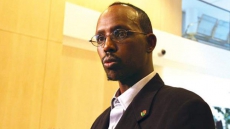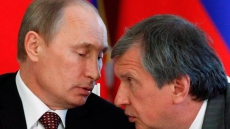NEW YORK - There's positive fiscal news coming soon from the federal government, Prime Minister Stephen Harper revealed Wednesday during a public event in the United States.
The prime minister announced before a business audience that last year's deficit numbers will have to be revised, for the better.
He made the statement during a PowerPoint presentation at New York's Goldman Sachs investment bank, where he touted the performance of the Canadian economy.
"It says $16.6 billion," Harper said, of the deficit number for 2013-14, posted on the screen.
"That number will be somewhat... significantly... lower. Although we expect a very small deficit this year (in 2014-15), we will be very close (to surplus)... We're anticipating healthy surpluses."
That puts the government in a position to enter an election next year with fiscal room, to lower taxes or spend on campaign promises.
Opposition parties have accused the government of downplaying this year's finances, to suddenly announce a surplus in an election year.
The prime minister presented other slides showing Canada outperfroming other countries in a variety of areas, including federal debt-to-GDP ratio, new free-trade deals, and job growth.
But the moderator of the session challenged him on some of the claims. The Wall Street Journal's editor-in-chief told Harper he was using very favourable methodology to build his claim of higher job growth than the United States.
Gerard Baker said using 2006 as his baseline obscured the fact that more recently, as it emerges from its post-2008 mess, the U.S. has actually done better than Canada at creating jobs.
"You haven't really outperformed the U.S. since then," Baker said.

He also warned that Canada's economy is not being driven by external demand, but domestic consumption and increased debt. He also said that outside of the energy industry, Canada's economy was less successful, and he mentioned manufacturing in particular.
Harper contested Baker's interpretation of the baseline year for job-growth claims but, after a brief exchange, conceded: "It's flattened recently."
Harper also sought to reassure American markets about Canada's housing market. There's been speculation, in the U.S. as well, that the Canadian market might be due for a correction after having remained immune to the U.S.'s 2007-09 crash.
But Harper was adamant: "Don't anticipate a housing crisis in Canada. It's not going to happen."
He said a rise in interest rates might hurt a small number of homeowners who over-extended themselves with debt in an era of low interest rates, particularly before Canada tightened some of its mortgage-lending standards under the late finance minister Jim Flaherty. But he noted that any increase in interest rates would also come at a time of robust economic growth, easing some of the pressure on indebted households.
There was also an exchange about American tax policy.
Harper took a veiled swipe at the U.S. political system, which has talked for years about reforming the American tax code but can't get any agreement in Congress about how to achieve that.
Now, because of U.S. tax rules including higher-than-average corporate rates, a number of American companies are shifting their headquarters abroad as so-called "inversions." Burger King buying Tim Hortons has become the most famous example of that, and the Obama administration has responded by promising to clamp down on inversions.

"Business activity moving to where tax rates — and where economic environments — are more competitive, is just the law of economics," Harper replied, when asked about the latest news on inversions.
"Good governments structure themselves in a way that they receive that capital flow, rather than lose it."





